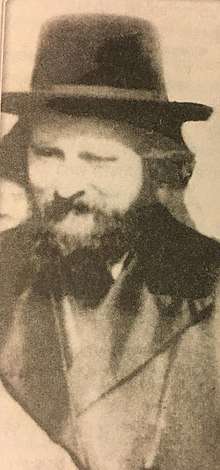David Moshe Rabinowicz
Rabbi David Moshe Rabinowicz (1906-1942) was the Rosh Yeshiva of Kibbutz Govoha and the entire Keser Torah network. The network had 36 schools, throughout Poland, with an enrollment exceeding 4,000 students.

Biography
Rabbi David Moshe was the son of Rabbi Nosson Nachum Hakohen Rabinowicz the Rebbe of Krimilov, and grandson of the second Radomsker Rebbe, Rabbi Avraham Yissachar Dov Hakohn Rabinowicz.[1], he married Reizel the only daughter of his first cousin Rabbi Shlomo Chanoch Rabinowicz who was the fourth Radomsker Rebbe.[2] [3][4]
Rosh Yeshiva
When Rabbi Shlomo Chanoch Rabinowicz established Kibbutz Govoha in the city of Sosnowiec exclusively for high-level students and avreichim (married students), he appointed his son-in-law, Rabbi David Moshe Hakohen Rabinowicz (1906–1942), a brilliant Torah scholar, to head it. Rabbi David Moshe also served as rosh yeshiva of the entire Keser Torah network, monitoring students' progress, delivering shiurim, and administering the end of the semester tests.[4] By 1930, nine yeshivas and the kibbutz were functioning. Over the following decade, more yeshivas were added.[2] On the eve of World War II, there were 36 Keser Torah yeshivas enrolling over 4,000 students in Poland. The yeshivas were disbanded after the German invasion of Poland in 1939, and most of their students were murdered in the Holocaust.[2]
World War II
Rabbi David Moshe Rabinowicz, was incarcerated in the Warsaw Ghetto where he continued to give regular shiurim , and also composed many chiddushim (novel Torah thoughts) which his students recorded. All of these chiddushim as well as the sefarim he had written previously were lost in the war.[5]
Death
Rabbi David Moshe Rabinowicz, his wife Reizel and their infant son, were killed during the aktion of 1 August 1942.[6].
References
- "A World That Was", Hamodia Magazine, 21 July 2011, p. 7.
- Tannenbaum, Rabbi Gershon (7 April 2009). "Radomsker Rebbe's Yahrzeit". The Jewish Press. Archived from the original on 15 June 2012. Retrieved 12 July 2011.
- Rabinowicz, Tzvi (1988). Hasidism: The movement and its masters. J. Aronson. p. 276. ISBN 0-87668-998-5.
- "Keser Torah Radomsk". radomsk.org. Archived from the original on 18 February 2012. Retrieved 20 July 2011.
- Shema Yisrael, pp. 329–330.
- Tannenbaum, Rabbi Gershon (7 April 2009). "Radomsker Rebbe's Yahrzeit". The Jewish Press. Retrieved 12 July 2011.